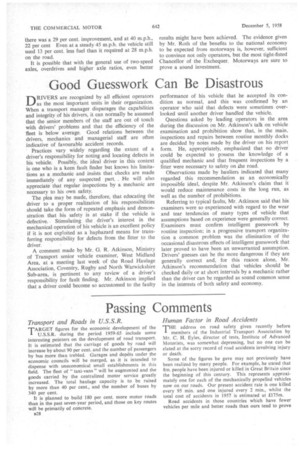Good Guesswork Can Be Disastrous
Page 34

If you've noticed an error in this article please click here to report it so we can fix it.
-n, RIVERS are recognized by all efficient operators J—1 as the most important units in their organization. When a transport manager disparages the capabilities and integrity of his drivers, it can normally be assumed that the senior members of the staff are out of touch with drivers' problems and that the efficiency of the fleet is below average. Good relations between the drivers, mechanics and managerial staff are often indicative of favourable accident records.
' Practices vary widely regarding the extent of a driver's responsibility for noting and locating defects in his vehicle. Possibly, the ideal driver in this context is one who is a keen fault finder but knows his limitations as a mechanic and insists that checks are made immediately of any suspected part. . He will also appreciate that regular inspections by a mechanic are necessary to his own safety.
The plea may be made, therefore, that educating the driver to a proper realization of his responsibilities should take the form of repeated emphasis and demonstration that his safety is at stake if the vehicle is defective. Stimulating the driver's interest in the mechanical operation of his vehicle is an excellent policy if it is not exploited as a haphazard means for transferring responsibility for defects from the fitter to the driver.
A comment made by Mr. G. R. Atkinson, Ministry of Transport senior vehicle examiner, West Midland Area, at a meeting last week of the Road Haulage Association, Coventry, Rugby and North Warwickshire Sub-area, is pertinent to any review of a driver's responsibility for fault finding. Mr. Atkinson implied that a driver could become so accustomed to the faulty performance of his vehicle that he accepted its condition as normal, and this was confirmed by an operator who said that defects were sometimes overlooked until another driver handled the vehicle.
Questions asked by leading operators in the area during the discussion on Mr. Atkinson's talk on vehicle examination and prohibition show that, in the main, inspections and repairs between routine monthly docks are decided by notes made by the driver on his report form. He, appropriately, emphasized that no driver could be expected to possess the knowledge of a qualified mechanic and that frequent inspections by a fitter were necessary to safety on the road.
Observations made by hauliers indicated that many regarded this recommendation as an economically impossible ideal, despite Mr. Atkinson's claim that it would reduce maintenance costs in the long run, as well as the number of prohibitions.
Referring to typical faults, Mr. Atkinson said that his examiners were so experienced with regard to the wear and tear tendencies of many types of vehicle that assumptions based on experience were generally correct. Examiners must confirm intelligent guesswork by routine inspection; in a progressive transport organization a common problem was the elimination of the occasional disastrous effects of intelligent guesswork that later proved to have been an unwarranted assumption. Drivers' guesses can be the more dangerous if they are generally correct and, for this reason alone, Mr. Atkinson's recommendation that vehicles should be checked daily or at short intervals by a mechanic rather than the driver can be regarded as sound common sense in the interests of both safety and economy.
























































































































